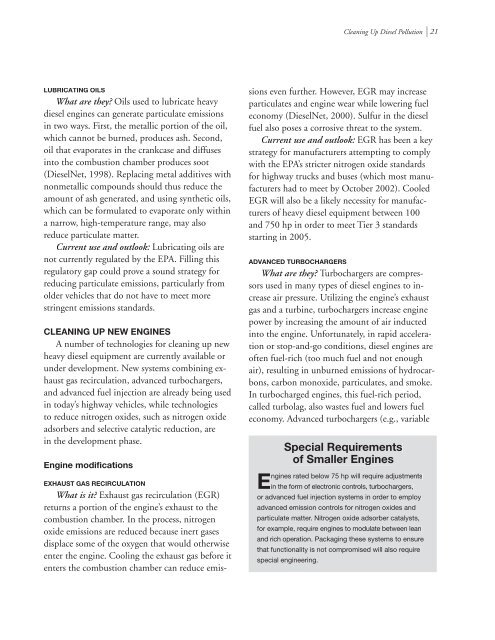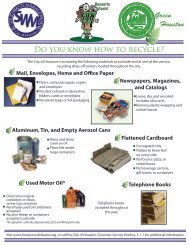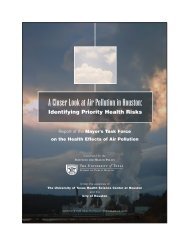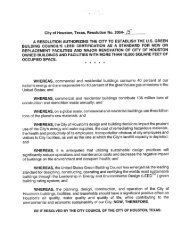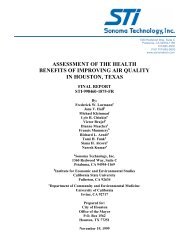Cleaning Up Diesel Pollution - Union of Concerned Scientists
Cleaning Up Diesel Pollution - Union of Concerned Scientists
Cleaning Up Diesel Pollution - Union of Concerned Scientists
- No tags were found...
You also want an ePaper? Increase the reach of your titles
YUMPU automatically turns print PDFs into web optimized ePapers that Google loves.
<strong>Cleaning</strong> <strong>Up</strong> <strong>Diesel</strong> <strong>Pollution</strong> l 21LUBRICATING OILSWhat are they? Oils used to lubricate heavydiesel engines can generate particulate emissionsin two ways. First, the metallic portion <strong>of</strong> the oil,which cannot be burned, produces ash. Second,oil that evaporates in the crankcase and diffusesinto the combustion chamber produces soot(<strong>Diesel</strong>Net, 1998). Replacing metal additives withnonmetallic compounds should thus reduce theamount <strong>of</strong> ash generated, and using synthetic oils,which can be formulated to evaporate only withina narrow, high-temperature range, may alsoreduce particulate matter.Current use and outlook: Lubricating oils arenot currently regulated by the EPA. Filling thisregulatory gap could prove a sound strategy forreducing particulate emissions, particularly fromolder vehicles that do not have to meet morestringent emissions standards.CLEANING UP NEW ENGINESA number <strong>of</strong> technologies for cleaning up newheavy diesel equipment are currently available orunder development. New systems combining exhaustgas recirculation, advanced turbochargers,and advanced fuel injection are already being usedin today’s highway vehicles, while technologiesto reduce nitrogen oxides, such as nitrogen oxideadsorbers and selective catalytic reduction, arein the development phase.Engine modificationsEXHAUST GAS RECIRCULATIONWhat is it? Exhaust gas recirculation (EGR)returns a portion <strong>of</strong> the engine’s exhaust to thecombustion chamber. In the process, nitrogenoxide emissions are reduced because inert gasesdisplace some <strong>of</strong> the oxygen that would otherwiseenter the engine. Cooling the exhaust gas before itenters the combustion chamber can reduce emissionseven further. However, EGR may increaseparticulates and engine wear while lowering fueleconomy (<strong>Diesel</strong>Net, 2000). Sulfur in the dieselfuel also poses a corrosive threat to the system.Current use and outlook: EGR has been a keystrategy for manufacturers attempting to complywith the EPA’s stricter nitrogen oxide standardsfor highway trucks and buses (which most manufacturershad to meet by October 2002). CooledEGR will also be a likely necessity for manufacturers<strong>of</strong> heavy diesel equipment between 100and 750 hp in order to meet Tier 3 standardsstarting in 2005.ADVANCED TURBOCHARGERSWhat are they? Turbochargers are compressorsused in many types <strong>of</strong> diesel engines to increaseair pressure. Utilizing the engine’s exhaustgas and a turbine, turbochargers increase enginepower by increasing the amount <strong>of</strong> air inductedinto the engine. Unfortunately, in rapid accelerationor stop-and-go conditions, diesel engines are<strong>of</strong>ten fuel-rich (too much fuel and not enoughair), resulting in unburned emissions <strong>of</strong> hydrocarbons,carbon monoxide, particulates, and smoke.In turbocharged engines, this fuel-rich period,called turbolag, also wastes fuel and lowers fueleconomy. Advanced turbochargers (e.g., variableSpecial Requirements<strong>of</strong> Smaller EnginesEngines rated below 75 hp will require adjustmentsin the form <strong>of</strong> electronic controls, turbochargers,or advanced fuel injection systems in order to employadvanced emission controls for nitrogen oxides andparticulate matter. Nitrogen oxide adsorber catalysts,for example, require engines to modulate between leanand rich operation. Packaging these systems to ensurethat functionality is not compromised will also requirespecial engineering.


